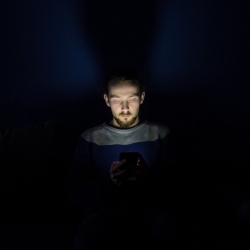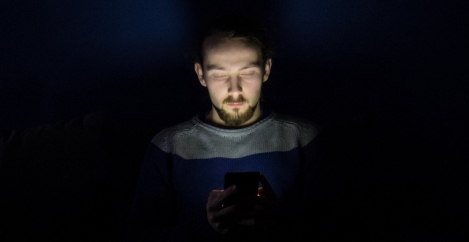November 26, 2020
People still struggling with shift to remote living
 A lack of balance through lockdown has been felt most dramatically by Brits living in house shares according to new research released by Microsoft Windows. The research claims that over 40 percent of people living with house mates, friends or professionals are finding it increasingly difficult to destress and unwind after a long and challenging day; while a further 1 in 5 of the UK population admit that work and play has become blurred in 2020.
A lack of balance through lockdown has been felt most dramatically by Brits living in house shares according to new research released by Microsoft Windows. The research claims that over 40 percent of people living with house mates, friends or professionals are finding it increasingly difficult to destress and unwind after a long and challenging day; while a further 1 in 5 of the UK population admit that work and play has become blurred in 2020.
The research also claims that our digital health has a key role to play in this imbalance, with a quarter of the UK population admitting that while working days are now longer, it doesn’t mean that they’re more productive, with those Brits also sharing that tasks are taking much longer due to difficulties being able to focus.
When it comes to our relationship with tech, a third of Brits admit that they don’t feel comfortable with their digital health right now and almost a third of gen-z Brits (18-24) say they feel a pressure to be ‘always on’ virtually with friends, family and colleagues. To address these challenges, Windows has partnered with psychotherapist, Zoe Aston to release tips and resources to help people assess and address their digital health; ensuring they can feel in control of their technology, not overwhelmed by it.
“Just like the crucial role of diet, exercise, sleep and relationships to our overall health, digital health is the fifth pillar we have to consider in our journey to improve our overall mental and physical wellbeing. Our world has changed more in the past 12-months than it has in the past five years and for many of us, our new reality has left us feeling overwhelmed and off balance.
[perfectpullquote align=”right” bordertop=”false” cite=”” link=”” color=”” class=”” size=””]”Technology has been our lifeline through lockdown and a saviour for loneliness”[/perfectpullquote]
“Technology has been our lifeline through lockdown and a saviour for loneliness with the research revealing that 2 in 5 Brits living alone saying technology has helped them deepen their connection to others in 2020. However, we need to take a deeper look at our overall relationship with tech so that we can feel fulfilled by it consistently – truly making it work for us.” says Zoe Aston.
With research also suggesting that 1 in 5 Brits know there are features in technology to help them improve their digital health but they just don’t know where to look, Windows Consumer Category Director UK and Ireland, Dave Newton says Windows has a responsibility to help people better understand how Brits can unlock the tech tools at their fingertips; making tech work for them, not against them.
“The research shows that there’s a vital need for us to kick start a conversation about digital health, what it is and how we can help people navigate their use of tech so that they feel like it is there to empower and improve their lives – not complicate it. Our software, tools and apps are designed first and foremost to put people in control of their tech usage. From helping people find focus, minimise distraction and ultimately give people precious time back by accessing free tools like ‘Focus Assist’, through to helping people unlock their imagination and increase their energy during a mid-afternoon slump through creative apps. We want to help people unlock some of the tools that they have at their disposal right now that are designed to help them improve their digital health.”
Make technology work for you
Just like diet, your mind needs something different from your digital world to help keep it in balance. To gauge how balanced you feel, ask yourself daily how energised, productive, connected and relaxed you feel and rate yourself on a scale of 1 (lowest) to 10 (highest). If you’re at the low end of the scale and feeling lethargic, use tech in ways that help create energy and focus, to bring you back to a balanced state. For example, silence your notifications using a software tool like Focus Assist. If you’re at the high end of the scale and feeling energised, use tech in ways to help you channel that energy. Think of your digital health as a sliding scale that is always changing and use tech in ways to help you achieve balance, which on this scale is anything between 3 and 8.
Set your digital boundaries
Take control of your digital health by setting realistic boundaries, like placing limits on how late you respond to work emails or the time you spend on social media daily. Parameters like these should help you to stay in balance. If working from home is making it difficult for you to separate your work and home life, there are tools available to help. With Windows, for example, you can create two different desktops. This allows you to have one view for your work life and a completely separate one for your personal life.
Notice your patterns
What digital patterns do you notice throughout the day? How do they make you feel and what would you like to change? Do you have lunch in front of your laptop or wake-up reaching for your phone, like Windows research shows 45 percent of Brits admit to doing? Be aware and note down patterns over a few days to discover any unhelpful behaviours. Then, think about how you can switch one out. Instead of turning to a device when your alarm goes off, for example, can you reach for a morning tea instead? Try adding reminders to your calendar or notebook to create healthier habits over time and improve your #digitalwellbeing.
Move your body
You should consider your physical and digital wellbeing as one and the same. Make sure that you are moving your body regularly and allowing it to refresh, just like you do your browser. Why don’t you take advantage of some of the online classes that are being made available right now? Microsoft 365 subscribers can access a range of partner benefits, including a 45-day fitness challenge with Fitbod. It might be just the ticket this winter.
Unlock your imagination
Mindfulness is a simple practice of choosing where your focus and energy is?directed. Think back to your sliding scale. If your answers put you?between 8 and 10, it’s likely that you have energy to channel. Our research suggests that 60 percent of Brits say exploring a creative side to themselves helps to improve their overall health and wellbeing and so this is a great?opportunity to unlock your imagination, connect with others, and even flex?your creative muscles using technology. You could try digital doodling for?example. Use the Night Light Settings if you’re doing this in the evening to?remove the blue light in your device. This will help you to transition from an?energised state into sleep mode.
Image by Krzysztof Kamil













